|
This document was submitted by Maurice Chauvet, a member of the 7th Armored Infantry Battalion, Company B.
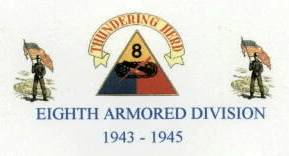
This following journal was written by an unknown G. I. who was a member of the 7th Armored Infantry Battalion, Company B. It is a daily journal about the journey of Company B from the time it left Camp Polk, Louisiana, thru France, Germany, Belgium, Holland and finally to Pilsen, Czeckoslavakia.
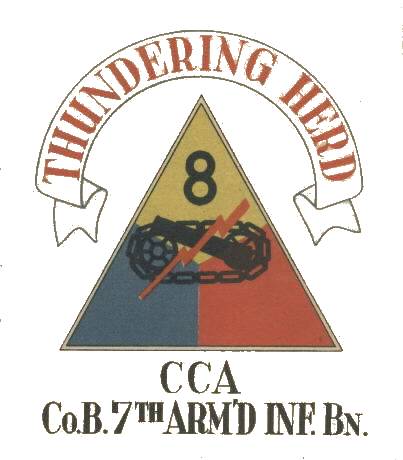
In Memory
of
Captain Grover M. Hermann, Jr.
Commanding Officer
Company B
Killed in action January 25, 1945
FOREWORD
There is perhaps no better place where I can express my appreciation to the men of Company B than in this brief record of our ETO memories.
No one that reads this record, except the men that lived it, will ever realize how much drama is packed between the lines. The bitterness of our battle innoculation in the Siegfried line; the tenseness as we crossed the Roer; the expectancy and the optimism as we moved East from the Rhine. None of us will ever forget our individual feelings as we moved toward each new mission.
We will never forget the men who made the supreme sacrifice, or those who were wounded in the performance of their duty. Their courage and devotion played a big part in our combat success.
If this is to be but a milestone in our combat record, I have no doubt of the ability of Company B to turn from Krauts to Japs, and maintain the same high standards of Courage, Comradeship, and Fighting Spirit.
J. Fisher
Captain, Infantry
ETO MEMORIES
We know that past months have forged a memory we can never leave behind. However, in years to come some of the clarity will fade, for the days of battle are without time, they are hard to measure, and even now our combat days all run together into a blurred mass in my memory. There are towns we will never forget, some just wide spots in the road, others real cities. These names will forever be with us, for in those places we lost friends, found new ones, and made history for the world to remember. The record of these accomplishments I should like to keep. War is nothing to be proud of, yet and assignment well done despite dangers, privations, and hardships is to be admired.
Although in combat and service we have not done as much as many, still we far outrank others. Our landing in France, January 5th, 1945 makes us young, yet we are proud of ourselves. We came a long way from the hot sun and sands of Camp Polk, Louisiana. The long train ride to our POE, the strangeness of censorship, the queer feeling in the pit of our stomachs as we strode up the gangplank onto the H. M. T. SAMARIA, the monotony of the sea for endless days, then for 45 days, England--------our first foreign land-------London--------Tidworth---------remember?------- then France.
France was covered with snow and the weather was a bitter numbing cold. The cruel, cramped, torture of the tracks as night and day we roared across France can be felt yet. We went across France in a series of jumps. We landed at La Harve and went North to Pierville, inland a short way from Dieppe. January 9th we went 175 miles Southeast to a bivouac 12 miles East of Reims where we lived in the snow for three days. Then we went 100 miles further to Maille, France----near Nomeny. Of our three stops we had two beautiful old chateaus that, unfortunately, however, had been well gutted by war. So we sat at Mailly and wondered----and waited----and wondered some more. Finally, on the 19th, we went Northward to Sierck, France, and it was there we learned of our first mission.
It was in the Third Army sector and we were going in to give armored assistance. We knew the score, only too well !! Our mission was to relieve an old and battle-wise division, the 94th Infantry, that had thrice captured Nenning and thrice been thrown out. Nenning was a tiny town just inside Germany and a very integral segment of the well known Siegfried Line. It was essential to Jerry to hold it, and necessary for us to take it. It is almost on the tri-border of France, Germany and Luxemborg. Ideally situated with perfect defensive terrain, was one of Hitler's finest---the 11th Panzer Division. It was truly a "No Man's Land." That was our mission---and we were scared, but plenty.
January 25th, at 0550, Lt. Ballentine's Third Platoon led the Company in the attack. Perhaps we knew the score too well, but the thought of combat infants, such as we, attempting what men had failed was overpowering. The first two houses we took with light resistance, then, as all Hell broke loose around us---we became veterans. We fought in the day and in the night with everything from our artillery and tanks, to the grenade and bayonet. During the course of events, 2nd Lt. Fisher became Company Commander. The town was won, held and we pushed beyond into the fields until at last on January 31st, our mission complete, we pulled back to Mailly, France, to rest. We had been the victor but with no small coat. One look at the empty tracks took all the vanity and conceit away. Tiger Royals, Screaming Mimis", Trench foot, and always the intense cold were enemies which overcame many. When the Division Band heralded its first veterans, there were no cheers---only sober thoughts and perhaps a brief moment of thankfulness that some very earnest prayers were heard.
So we rested----- February 2nd we started a 205 mile move to Ingber, Holland (near Gulpen and Maastrich), where we had our first civilian billets. They were wonderful people, the Hollanders. So much so, that, combined with the coming of Spring, it was difficult to believe there was a war. We gained new comrades as replacements again strengthened our ranks. T/Sgt. Dunn of the First Platoon was awarded the Silver Star for gallantry in action January 25-31, 1945. The 21st of February we left for Echt, Holland. On the 25th we went to Montfort, on the approaches to Roermond---where we dug in and held in reserve.
Then on February 27th we learned the mission of our northern drive. We were to force an armored breakthrough on the infantry bridgehead over the Roer River at the door to Germany. For that purpose we had been released from attached to the Third Army and assigned to the Ninth Army. The afternoon of the 27th we had pulled out of our Montfort positions, gone South, and were crossing the Roer by dark. We moved forward in attack---or as it is officially described "combat mission in hostile territory". There is an interesting and unknown angle to this. Originally on crossing we were leading CCA into an assembly area to await further orders. Just as we neared the river a Major approached Lt. Fisher and made these changes: 1. We were now leading the Division. 2. Contact had been lost with the enemy and so keep going till we hit something. 3. There was not route selected, just any road going East. We traveled all night in this fashion and at dawn encountered resistance, and so on the 28th we attacked Merbeck with the Tank-Infantry team victorious.
Flashy, with a lot of fire works, we moved in and through that morning, suffering only light casualties. That afternoon we moved to the left flank of Tettlerath to give supporting fire to another attacking unit. During the action the Third Platoon was pinned down in a heavy woods and only after achieving superiority of fire managed to withdraw with no losses and 30 prisoners. We slept in Merbeck and March 1st moved on to Waldnier cleaning out pillbox after pillbox, many cleverly concealed as stables, houses or strawstacks. Moving was difficult and the Third Platoon supported our Engineers while clearing mines, roadblocks, and throwing up a bridge. All under scattered resistance. Jerry was retreating rapidly but we kept nipping at his heels. March 2nd was Hinsbeck, March 3rd we reached Herongen for a day of rest and a brief moment of stolen glory in some local dignitary's black silk top hat. On March 4th we arrived at Wankum and stopped as the going was so easy that the two flanking Divisions, the 84th and the 35th Infantries, had converged, forcing us to halt and wait.
We knew now that we were to wait but for the crossing of the Rhine. Yet we wondered at the nature of our mission when we took assault boat training on March 15th. "And rumors shall blow as the wind----" March 7th, 61 men of B Company were awarded the Combat Infantry Badge for their action against the enemy in Germany, January 25-31, 1945. The 24th of March we realized our time was near as huge armadas of planes and gliders filled the skies for hours. On the 26th of March, at 2350 we left Wankum to cross the Rhine. It was a bright night and the size of the river surprised us all, as we came to the vast marshalling area and then, under armor priority, crossed. We passed on a pontoon treadway bridge 1400 feet in length. Arriving at Hunxe at 0615, the 27th, having traveled 55 most important miles, we halted to prepare for another armored drive. In crossing the Roer it was common knowledge that the Rhine was our limit, but now all limitations had been lifted. We carried double rations and ammo, with orders to eat off the land whenever necessary.
The 28th of March we started our drive on Dorsten, passing through the 30th Division, from the vicinity of Hunxe, at 0600. By 0730 our initial objective, Imloh was taken and the attack on the main objective, Dorsten, continued. That night Lt. Tegge led a picked patrol of 20 men from the Second Platoon into Dorsten and back. They reported the enemy digging in, in strength. At 0330 the morning of the 29th we moved on foot under cover of darkness and drizzly rain past a battery of 88's and through the main outer defense lines into the outskirts of Dorsten, thereby outflanking Jerry. By approximately 1000 resistance had ceased and the Battalion occupied Dorsten and prepared for further attack. The next day we moved forward and continued the attack on enemy installations three miles East of Dorsten. Quoting the 1st Sgt's notes, "Clearing weather, increased air support, morale excellent, and casualties light." We had moved up and into Kraut AA positions of a very elaborate nature when an intensive shelling by the tanks we had been chasing began. We had not been able to catch them (Thank God!) and our assigned air support took over the job. It was a beautiful sight to see those P47s nose over into a dive, strafing the enemy and then laying a few eggs just to do things up right.
The 31st we reached Tiegler and enjoyed a day of rest. Easter Sunday, April 1st, we left Tiegler at 0600 and traveled 30 miles to arrive near Vehoff by noon. There we had, for most of us, our first authorized G. I. liquor ration. The 2nd we left Vehoff at 0700 for a 70 mile jaunt to Delbruck. Suddenly we received a change of orders. We were halted on our race for Berlin and assigned the job of helping to clean out the Ruhr Pocket formed by the junction of the 1st and 9th Armies at Lippstadt, 20 miles West of Padderborn.
Reluctantly we turned and so on the third of April launched an attack on Eikloh. On the 4th we continued forward to Erwitte which we 'liberated' at 1430. The 5th we moved on capturing Enrochte, Waltringhausen, Robinghausen, Altengeske, and on the approaches to Neuengeske were forced to halt. We moved forward by foot after our tracks had drawn AT fire. It was 1900 and growing dark rapidly with the threat of rain. So we dug in for the night------and it rained. The next morning we were relieved and went to Altengeske for a day of rest. April 7th we went to Uhle and the 8th to Belecke where we rested. April 9th we advanced farther West to Dieringsen and the 10th set up outpost positions West of Buderich on the highway approaching Unna. April 11th, the company, acting as attack element of the task force, dismounted and led the attach on Unna at 0630. Heavy sniper fire was encountered and all but scattered resistance was gone by 1400. The Battalion the occupied and outposted Unna till the 13th. Meanwhile other forces driving from the West captured Dortmund and the job was done. So April 13th at 1800 we left Unna to resume the drive for Berlin. 'No More Pockets' was the promise.
Wolfenbuttel, the site of the famous Hermann Goering Works, employing over 80,000 slave laborers, was our next stop, 175 miles. We occupied and outposted by 1330 of the 14th. We left Wolfenbuttel the 17th and went to Ampfurth and on the 19th went to Hendeber, 26 miles. Then we heard the news, Berlin was not for us. The Americans had stopped at the Elbe, so now we were to go South to clear another pocket in the vicinity of Nordhausen.
NOTE: By Maurice Chauvet. I have taken the liberty to correct the following paragraph that begins April 20th. Upon reading the book "In Tornado's Wake" by Captain Charles Leach, in the chapter "Harz Mts" it tells of CCA, Company B capturing the Commanding General. On April 20th PFCs Chauvet, Arbanas, and Mankiewicz of the Company B Anti Tank Platoon, took a very high ranking officer and his orderly prisoner. It was the General Kokott that Captain Leach describes in his book. The General was waiting for someone to enter the house where he and his orderly were, with his luggage all packed. The General was a very arrogant S. O. B, ignoring us as he spoke in German to his orderly, who began picking up the luggage and his beautiful fur lined cape. Mankiewicz knocked the luggage out of the orderly's hands and told him to get out while Arbanas and I prodded the General out. We took them to a Collection Point where we left them. Mankiewicz went back and retrieved the fur lined cape, tore off the insignia and put it on. From then on, he was the warmest G. I. in the back of our half track - all wrapped up in his cozy cape. I have left the incorrect paragraph in the document and the correct paragraph follows it. END OF NOTE.
((April 20th we spent cleaning out woods and capturing over 500 prisoners including the Commanding General of the 11th Panzer Army and numerous lesser divisional commanders and other small fry. We encountered heavy roadblocks and light fire from a trapped AA unit and were delayed considerably by the burning of their ammo trains, but managed to occupy Heinbeck by evening. The next day we attacked Michaelstein with the AT in the lead. After intense small arms fire the town was occupied by noon.))
Corrected paragraph is as follows:
April 20th we spent cleaning out woods and capturing over 500 prisoners including the Commanding General of the 26th Volks Grenadier Division, Brigadier General Heinz Kokott, and numerous lesser divisional commanders and other small fry. We encountered heavy roadblocks and light fire from a trapped AA unit and were delayed considerable by the burning of their ammo trains, but managed to occupy Heinbeck by evening. The next day we attacked Michaelstein with the Anti Tank platoon in the lead. After intense small arms fire the town was occupied.
That was the last of this small pocket so on the 22nd of April we came to Bad Lauterberg in Harz Mountains for an indefinite stay. On the 24th T/Sgt. Martinek of the Third Platoon received his discharge from the Army of the United States and on the 25th was appointed 2nd Lt. in the Infantry, the Company's first "Battlefield Commission". We then sat back in Lauterberg and watched Germany rapidly fold up. Hitler died May 1st naming Admiral Doenitz as his successor. Then in quick succession came the German surrender of all troops in Italy, Northern Germany, Army group G surrender in Southern Germany, and finally on May 7th, at 0241 in General Eisenhower's Rheims Headquarters the unconditional surrender of all German forces was signed. VE day on May 9th marked the end of our job in the ETO.
Then in late May, we were ordered South to Pilsen, Czeckoslavakia. The Company closed in Pilsen, on June 6, 1945 and remained there until Sept 19th for return to the United States and inactivation on November 13, 1945
LEST WE FORGET
Capt. GROVER M. HERMANN, Jr.
Sgt. EARL V. SPRINGER
S/Sgt. CHARLES V. MEDZARENTZ
Cpl. DONALD P. LYNN
T/5 JOHN J CARUSO
Pfc. IRA B CASEY
Pfc. CLYDE A. BARNES
Pfc. CLAUDE E EUBANKS
Pfc. FLOYD B. HAULMAN
Pfc. WAYNE B. MARTIN
Pfc. CHARLES R NEEDHAM, Jr.
Pvt. WILLIAM H. DYKHUIS
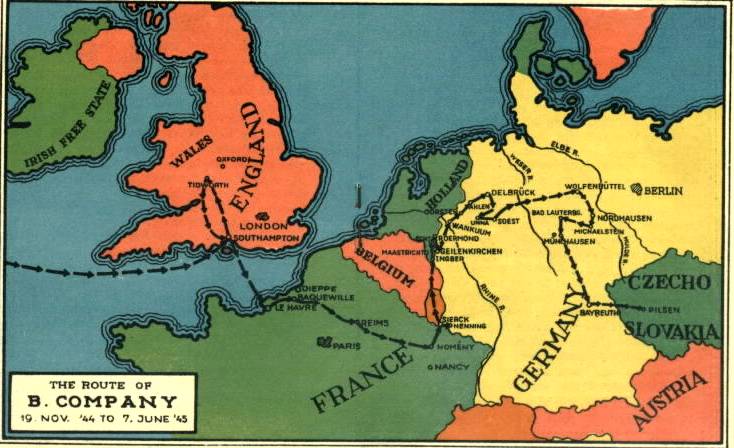
A V-E DAY MESSAGE FROM THE
COMMANDING GENERAL
OF THE EIGHTH ARMORED DIVISION
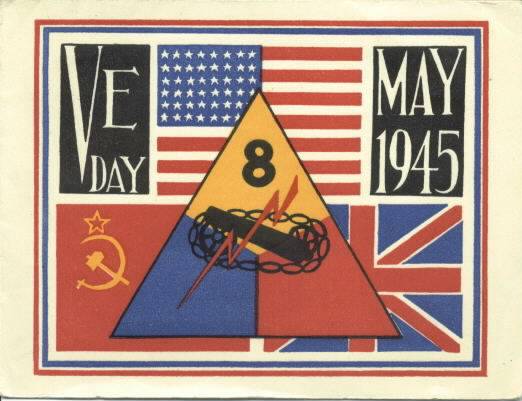
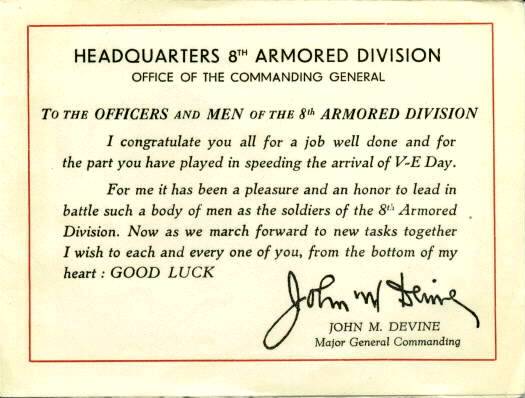


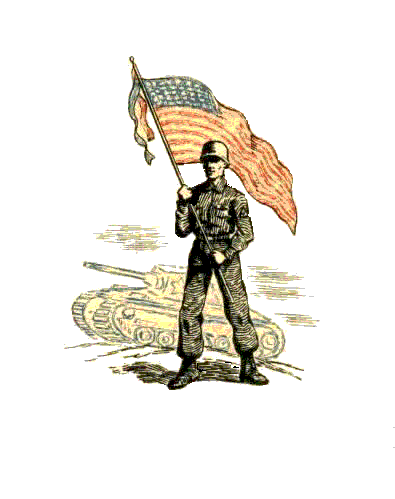
|